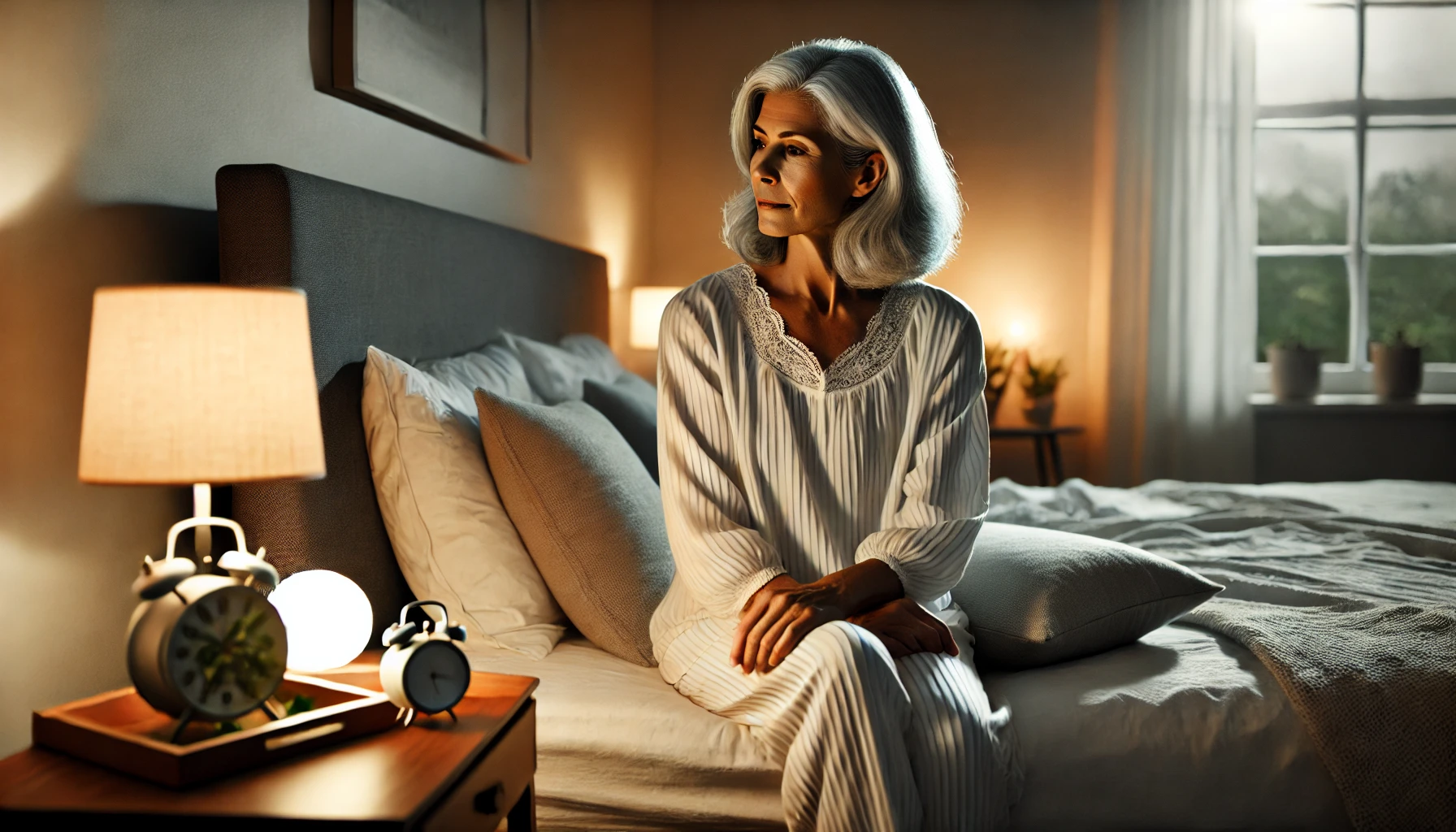It’s 2:47 a.m., and the ceiling fan hums a rhythm I know all too well. I’m lying there, staring at the darkness, watching the clock tick away precious hours of sleep I so desperately need.
Tomorrow’s demands already feel like a weight on my chest, but my mind won’t shut off, and my body refuses to cooperate. If this sounds like your reality, you’re not alone.
“I toss and turn all night. How am I supposed to function without sleep?”
If this thought has ever crossed your mind—likely in the dead of night while flipping your pillow for the cooler side—you’re in the right place.
Sleeplessness during menopause is a battle many women fight silently, often chalked up to “just part of aging.” But let’s be clear: sleep is not a luxury. It’s the foundation for how we live, think, and feel. Losing it night after night?
That’s not just frustrating—it’s downright debilitating.
The Invisible Thief
For many of us, menopause feels like an uninvited guest wreaking havoc on every part of our lives. It starts subtly. Maybe you wake up once or twice a night feeling oddly warm.
Then the full-blown night sweats set in—those sudden, drenching waves that leave your pajamas clinging to your skin and your sheets in a heap on the floor. You get up, adjust the thermostat, splash cold water on your face, and hope for the best.
But it’s not just the heat stealing your rest. Your mind, once your ally, becomes your nemesis. Thoughts spiral—what did I forget today? Will I be able to focus tomorrow? Why can’t I just sleep?
And just like that, you’re wide awake in a quiet house, grappling with the uncomfortable reality of insomnia.
Why Menopause Messes with Your Sleep
Here’s the thing: menopause isn’t just a shift in your body; it’s a hormonal rollercoaster. As estrogen and progesterone levels dip and dive, they take your body’s natural sleep regulation along for the ride.
Estrogen, often called the “calming” hormone, helps stabilize mood and regulate temperature. Without it, your body struggles to maintain a steady state, leading to those infamous hot flashes and restless nights.
Then there’s cortisol—the stress hormone. When sleep is elusive, your body ramps up cortisol production, creating a vicious cycle. The more stressed you feel about not sleeping, the harder it becomes to actually fall asleep.
And let’s not forget the emotional side. Menopause doesn’t happen in isolation. It coincides with life’s other curveballs: aging parents, career pressures, kids leaving home, or even rekindling (or redefining) your relationship with your partner.
It’s no wonder your brain won’t turn off when the lights go out.
Real Talk: It’s Not Just You
One of the most isolating parts of menopause-related insomnia is the silence surrounding it. Let’s be honest—how often do you hear women openly sharing their 3 a.m. struggles? Sure, there’s some talk about hot flashes or mood swings, but sleep?
That’s a topic we tend to sweep under the rug. Maybe it’s embarrassment, or maybe we’re too exhausted to even talk about it.
But the truth is, countless women are lying awake, just like you. It’s not just “a bad week” or “too much caffeine.” It’s a real, pervasive issue, and it’s time we start addressing it with the seriousness it deserves.
Can Anything Help?
The good news? You’re not powerless against menopause-induced insomnia. While there’s no one-size-fits-all solution, small, intentional changes can make a big difference. Let’s explore a few:
- Cool the Room, Cool the Body
Temperature regulation is everything. Invest in breathable sheets and moisture-wicking pajamas. A fan, cooling pillow, or even a cold pack by the bedside can work wonders when a hot flash strikes. - Stick to a Routine
Your body thrives on consistency. Going to bed and waking up at the same time every day helps reset your internal clock, even when menopause tries to throw it off balance. - Rethink Your Nighttime Rituals
Caffeine after lunch? Probably not the best idea. Same goes for alcohol, which might make you sleepy initially but disrupts deep sleep later on. Instead, try herbal teas like chamomile or valerian root. - Unwind Your Mind
If your thoughts tend to spiral at night, give them an outlet. Journaling before bed can help declutter your mind. Or try guided meditations or gentle stretches to signal to your body that it’s time to wind down. - Consider Professional Support
Sometimes, the best step you can take is asking for help. Whether it’s hormone replacement therapy, sleep-focused cognitive behavioral therapy, or a conversation with your doctor about other treatments, don’t shy away from seeking expert advice.
The Emotional Toll of Sleeplessness
Of course, insomnia isn’t just a physical battle; it’s an emotional one, too. After a sleepless night, everything feels harder. Patience runs thin, emotions feel raw, and even small tasks can seem monumental.
It’s a cruel irony: the more exhausted you are, the more the world demands from you.
If you’re feeling this way, let me remind you of something important: this struggle does not define you. You’re not “less than” because you’re tired, and you’re not weak for feeling overwhelmed.
Menopause is hard. Full stop. But it’s also a season—a phase that, while challenging, is not forever.
Finding Hope in the Darkness
When you’re in the thick of sleepless nights, it’s easy to feel like this is just how life will be now. But know this: you’re not stuck here. You have tools, resources, and a community of women who understand exactly what you’re going through.
Start small. Maybe tonight, you try adding one calming ritual to your bedtime routine. Or maybe tomorrow, you call a friend who’s been through menopause and share your story. You might be surprised at how many women nod knowingly and say, “Me too.”
Because at the end of the day, menopause isn’t just about the symptoms—it’s about how we adapt, grow, and ultimately reclaim our sense of self in the face of change. Sleepless nights might be part of the journey, but they don’t have to be the whole story.
So tonight, when the clock reads 2:47 a.m. and the familiar hum of the fan surrounds you, remember: you’re not alone in this. There’s a way forward, one step (or one deep breath) at a time.





